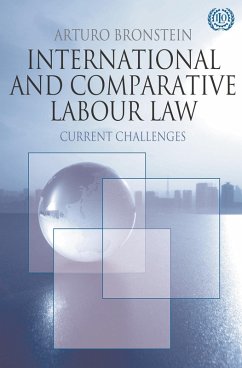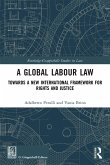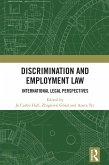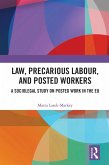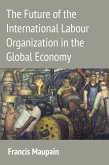58,95 €
58,95 €
inkl. MwSt.
Sofort per Download lieferbar

29 °P sammeln
58,95 €
Als Download kaufen

58,95 €
inkl. MwSt.
Sofort per Download lieferbar

29 °P sammeln
Jetzt verschenken
Alle Infos zum eBook verschenken
58,95 €
inkl. MwSt.
Sofort per Download lieferbar
Alle Infos zum eBook verschenken

29 °P sammeln
- Format: PDF
- Merkliste
- Auf die Merkliste
- Bewerten Bewerten
- Teilen
- Produkt teilen
- Produkterinnerung
- Produkterinnerung

Bitte loggen Sie sich zunächst in Ihr Kundenkonto ein oder registrieren Sie sich bei
bücher.de, um das eBook-Abo tolino select nutzen zu können.
Hier können Sie sich einloggen
Hier können Sie sich einloggen
Sie sind bereits eingeloggt. Klicken Sie auf 2. tolino select Abo, um fortzufahren.

Bitte loggen Sie sich zunächst in Ihr Kundenkonto ein oder registrieren Sie sich bei bücher.de, um das eBook-Abo tolino select nutzen zu können.
A stimulating, authoritative account of international employment law written by a leading figure who for many years has shaped global policy, striving to implement fairer working conditions worldwide. We are expertly guided though the context and development of labour law, making this book ideal for study or research.
- Geräte: PC
- ohne Kopierschutz
- eBook Hilfe
Andere Kunden interessierten sich auch für
![A Global Labour Law (eBook, PDF) A Global Labour Law (eBook, PDF)]() Adalberto PerulliA Global Labour Law (eBook, PDF)42,95 €
Adalberto PerulliA Global Labour Law (eBook, PDF)42,95 €![Great Debates in Employment Law (eBook, PDF) Great Debates in Employment Law (eBook, PDF)]() Simon HoneyballGreat Debates in Employment Law (eBook, PDF)29,95 €
Simon HoneyballGreat Debates in Employment Law (eBook, PDF)29,95 €![Employment Law (eBook, PDF) Employment Law (eBook, PDF)]() Deborah J. LocktonEmployment Law (eBook, PDF)36,95 €
Deborah J. LocktonEmployment Law (eBook, PDF)36,95 €![Modern Employment Law (eBook, PDF) Modern Employment Law (eBook, PDF)]() Charles BarrowModern Employment Law (eBook, PDF)38,95 €
Charles BarrowModern Employment Law (eBook, PDF)38,95 €![Discrimination and Employment Law (eBook, PDF) Discrimination and Employment Law (eBook, PDF)]() Discrimination and Employment Law (eBook, PDF)39,95 €
Discrimination and Employment Law (eBook, PDF)39,95 €![Law, Precarious Labour and Posted Workers (eBook, PDF) Law, Precarious Labour and Posted Workers (eBook, PDF)]() Marta Lasek-MarkeyLaw, Precarious Labour and Posted Workers (eBook, PDF)39,95 €
Marta Lasek-MarkeyLaw, Precarious Labour and Posted Workers (eBook, PDF)39,95 €![The Future of the International Labour Organization in the Global Economy (eBook, PDF) The Future of the International Labour Organization in the Global Economy (eBook, PDF)]() Francis MaupainThe Future of the International Labour Organization in the Global Economy (eBook, PDF)74,95 €
Francis MaupainThe Future of the International Labour Organization in the Global Economy (eBook, PDF)74,95 €-
-
-
A stimulating, authoritative account of international employment law written by a leading figure who for many years has shaped global policy, striving to implement fairer working conditions worldwide. We are expertly guided though the context and development of labour law, making this book ideal for study or research.
Produktdetails
- Produktdetails
- Verlag: Bloomsbury eBooks UK
- Seitenzahl: 320
- Erscheinungstermin: 16. September 2017
- Englisch
- ISBN-13: 9780230300767
- Artikelnr.: 47860225
- Verlag: Bloomsbury eBooks UK
- Seitenzahl: 320
- Erscheinungstermin: 16. September 2017
- Englisch
- ISBN-13: 9780230300767
- Artikelnr.: 47860225
- Herstellerkennzeichnung Die Herstellerinformationen sind derzeit nicht verfügbar.
ARTURO BRONSTEIN specializes in international and comparative labour law. In recent years he provided advice on the revision of the Labour Law in several countries of Central Europe, such as (then) Serbia-Montenegro, Bosnia-Herzegovina, Romania, Ukraine, Slovakia and the territory of Kosovo. He also advised in 2001 the government of Cambodia, on the adoption of rules on enterprise level collective bargaining and collective disputes arbitration. He has authored many publications in the field of labour law and labour relations.
Having served at the ILO for 21 years, culminating in an appointment to Senior Labour Policy Advisor, Arturo Bronstein, has been influential in putting in place labour standards internationally. He left the ILO in November 2005, and since retiring has been lecturing on international and comparative labour law at the universities of Buenos Aires (Argentina), York (Ontario, Canada) and Paris X-Nanterre (France). He is the current Secretary General of the International Society for Labour and Social Security Law: http://www.asociacion.org.ar/ISLLSS
Having served at the ILO for 21 years, culminating in an appointment to Senior Labour Policy Advisor, Arturo Bronstein, has been influential in putting in place labour standards internationally. He left the ILO in November 2005, and since retiring has been lecturing on international and comparative labour law at the universities of Buenos Aires (Argentina), York (Ontario, Canada) and Paris X-Nanterre (France). He is the current Secretary General of the International Society for Labour and Social Security Law: http://www.asociacion.org.ar/ISLLSS
PART I: LABOUR LAW AT A CROSSROADS.- Labour Law's Origins and Influences.- Sources of Labour Law.- The Labour Maw model From 1945 to 1975.- The Standard Employment Relationship.- Worldwide Changes and the Emergence of a New Work Paradigm.- Stagflation and the Labour Flexibility Debate.- International Competition.- Technological Change and the Emergence of Post-Fordist Organizational Patterns.- The End of the Cold War.- Current Crises in Labour Law.- PART II: WHO IS PROTECTED BY LABOUR LAW?.- Labour Law and the Informal Economy.- Towards a Legal Definition of the Informal Economy.- Policy Issues.- Atypical Work: From Rejection to Integration in Labour Law.- Dependent-independent Workers and the Defocusing of the Employment Relationship.- Disguised Employment Relationships.- Decentralization of Production and its Impact on Labour and Employment Relations.- Challenges That Decentralization of Production Poses for Labour Law.- PART III: SECURITY OF EMPLOYMENT.- Unfair Dismissal.- An Increasing Number of Exceptions . . . That do not Reverse the Rule.- Limitations on the Abuse of Fixed-term Employment Contracts.- Remedies Against Unfair Dismissal.- PART IV: GLOBAL TRADE AND LABOUR LAW.- Is Substandard Labour a Legitimate Comparative Advantage?.- Strategies to Address the Relationship Between International Trade and Labour Rights.- International and Supranational Rules.- Harmonization.- The Social Clause: From WTO to ILO.- The ILO Declaration on Fundamental Principles and Rights at Work, 1998.- Labour-related Provisions in Multilateral and Bilateral Trade Agreements.- Unilateral Social Clauses: The Generalized System of Preferences.- Corporate Social Responsibility (CSR).- PART V: LEGAL SUBORDINATION AND THE FUNDAMENTAL RIGHTS OF THE PERSON.- Gender Discrimination.- Equal Pay.- Exceptions to the Equal Pay Rule.- Equal Treatment of Men and Women.- Access to Certain Jobs.- Pregnancy.- Night Work, Underground Work and Other Jobs Prohibited for Women.- Race Discrimination.- Religious Belief.- Other Kinds of Discrimination.- Family Responsibilities.- Sexual Harassment.- Sexual Orientation.- Age.- Disability.- State of Health and HIV/AIDS.- Affirmative (or positive) Action.- Protection of Privacy.- Video and Telephone Surveillance.- Freedom of Thought and Expression.- PART VI: REGIONAL PERSPECTIVES.- The European Union and the Emergence of Supranational Law.- The Impact of Recent ECJ Rulings on Labour Relations in the European Union.- Labour Law in Former Communist Countries.- Latin America.- Asia and the Pacific.- South Africa.- PART VII: FINAL REMARKS.
PART I: LABOUR LAW AT A CROSSROADS.- Labour Law's Origins and Influences.- Sources of Labour Law.- The Labour Maw model From 1945 to 1975.- The Standard Employment Relationship.- Worldwide Changes and the Emergence of a New Work Paradigm.- Stagflation and the Labour Flexibility Debate.- International Competition.- Technological Change and the Emergence of Post-Fordist Organizational Patterns.- The End of the Cold War.- Current Crises in Labour Law.- PART II: WHO IS PROTECTED BY LABOUR LAW?.- Labour Law and the Informal Economy.- Towards a Legal Definition of the Informal Economy.- Policy Issues.- Atypical Work: From Rejection to Integration in Labour Law.- Dependent-independent Workers and the Defocusing of the Employment Relationship.- Disguised Employment Relationships.- Decentralization of Production and its Impact on Labour and Employment Relations.- Challenges That Decentralization of Production Poses for Labour Law.- PART III: SECURITY OF EMPLOYMENT.- Unfair Dismissal.- An Increasing Number of Exceptions . . . That do not Reverse the Rule.- Limitations on the Abuse of Fixed-term Employment Contracts.- Remedies Against Unfair Dismissal.- PART IV: GLOBAL TRADE AND LABOUR LAW.- Is Substandard Labour a Legitimate Comparative Advantage?.- Strategies to Address the Relationship Between International Trade and Labour Rights.- International and Supranational Rules.- Harmonization.- The Social Clause: From WTO to ILO.- The ILO Declaration on Fundamental Principles and Rights at Work, 1998.- Labour-related Provisions in Multilateral and Bilateral Trade Agreements.- Unilateral Social Clauses: The Generalized System of Preferences.- Corporate Social Responsibility (CSR).- PART V: LEGAL SUBORDINATION AND THE FUNDAMENTAL RIGHTS OF THE PERSON.- Gender Discrimination.- Equal Pay.- Exceptions to the Equal Pay Rule.- Equal Treatment of Men and Women.- Access to Certain Jobs.- Pregnancy.- Night Work, Underground Work and Other Jobs Prohibited for Women.- Race Discrimination.- Religious Belief.- Other Kinds of Discrimination.- Family Responsibilities.- Sexual Harassment.- Sexual Orientation.- Age.- Disability.- State of Health and HIV/AIDS.- Affirmative (or positive) Action.- Protection of Privacy.- Video and Telephone Surveillance.- Freedom of Thought and Expression.- PART VI: REGIONAL PERSPECTIVES.- The European Union and the Emergence of Supranational Law.- The Impact of Recent ECJ Rulings on Labour Relations in the European Union.- Labour Law in Former Communist Countries.- Latin America.- Asia and the Pacific.- South Africa.- PART VII: FINAL REMARKS.
